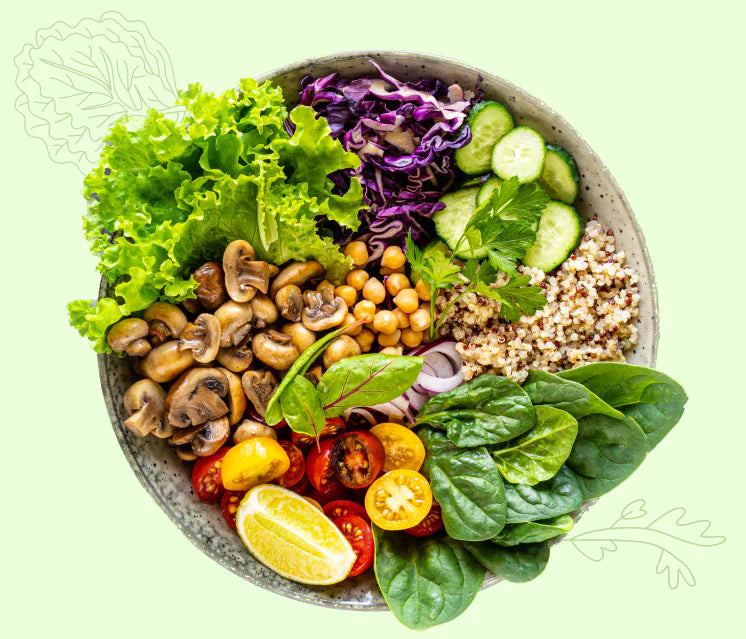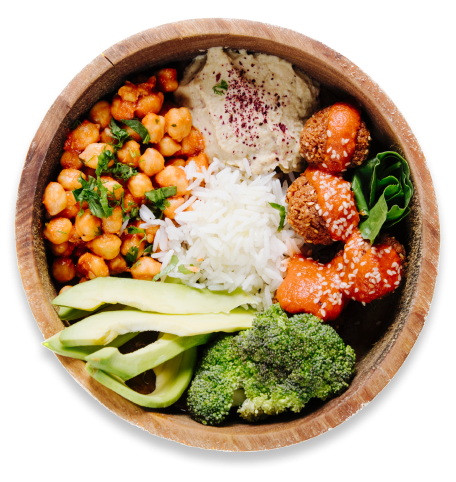Call Us 123456789
Free delivery on order over $200
Fats in a Vegan Diet: Why Healthy Fats Are Important and Where to Find Them
Buy meal plan
When people think of fat in food, they often assume it’s something to avoid. But not all fats are bad. In fact, Why Healthy Fats Are Important becomes especially clear when you realise they are essential for your body to function properly. If you're following a plant-based diet, you may wonder how to get enough good fats. The good news is, Vegan meal plans can easily include plenty of healthy fat foods without relying on animal products.
In this blog, we’ll explain why healthy fats are important in a vegan diet, the different types of fats, and the best plant-based fat sources. You’ll also learn how to include them in your meals, avoid common mistakes, and how a plant based food delivery service can help make healthy eating easier.
Why Your Body Needs Fat
Fat is one of the three major macronutrients your body needs, along with protein and carbohydrates. While carbs are often the go-to energy source, fats offer many important benefits that should not be ignored:
Energy source: Fats provide a long-lasting source of energy. In fact, fat contains more than twice the calories per gram compared to carbohydrates or protein, making it very energy-dense.
Nutrient absorption: Vitamins A, D, E, and K are fat-soluble. That means your body can only absorb them properly when fat is present in your diet.
Brain and nerve function: About 60% of your brain is made up of fat. Essential fatty acids play a vital role in maintaining brain health and supporting nerve signalling.
Cell structure and growth: Every cell in your body has a membrane made of fat. Fat helps build and repair cells, which is important for healing and overall growth.
Hormone production: Fats are needed to create important hormones like oestrogen, testosterone, and cortisol. These hormones help regulate sleep, mood, reproduction, and metabolism.
Without enough healthy fat foods, your body can’t perform these crucial functions efficiently.
Understanding the Different Types of Fat
There are four main types of dietary fat. Each has a different effect on your health:
Saturated fats – Mostly found in animal products like butter, cheese, and fatty meat. Some vegan fat-rich foods, such as coconut oil and palm oil, also contain saturated fats. While small amounts are okay, too much can raise LDL ("bad") cholesterol.
Trans fats – These are man-made fats created during the hydrogenation process used to increase the shelf life of processed foods. They are found in margarine, baked goods, and fried snacks. Trans fats are harmful and increase your risk of heart disease. Always avoid them.
Monounsaturated fats – These healthy fats are found in nuts, seeds, olive oil, and avocados. They help reduce bad cholesterol levels and support heart health. These are excellent vegan sources of healthy fat foods.
Polyunsaturated fats – These include omega-3 and omega-6 fatty acids. They are essential fats, meaning your body cannot produce them on its own and must get them from food. Found in flaxseeds, chia seeds, hemp seeds, and walnuts, these fats are vital for brain and heart health.
For a healthy vegan diet, focus on getting more monounsaturated and polyunsaturated fats.
Best Plant-Based Sources of Healthy Fats
One of the great things about a vegan diet is the variety of nutrient-rich foods available. Here are some of the top healthy fat foods:
1.Avocados
Avocados are rich in monounsaturated fat, which helps reduce inflammation and support heart health. They also contain fibre, potassium, and antioxidants. Spread avocado on wholegrain toast, blend into smoothies, or add to salads and wraps as part of your Vegan meal plans.
2.Nuts
Nuts like almonds, walnuts, cashews, and macadamias are high in healthy fats, plant-based protein, and important minerals like magnesium and zinc. A small handful of mixed nuts is a great snack, or you can toss them into salads, porridge, or stir-fries.
3.Seeds
Chia seeds, flaxseeds, sunflower seeds, pumpkin seeds, and hemp seeds are packed with omega-3 fatty acids and fibre. You can mix them into smoothies, sprinkle over your morning oats, or use them in baking. Ground flaxseeds are especially good for absorption in vegan diets.
4.Nut Butters
Natural peanut butter, almond butter, and cashew butter are delicious ways to get your healthy fats. Look for versions with no added sugar or hydrogenated oils. Use them on toast, in smoothies, or as a dip for fruits.
5.Olive Oil and Other Cold-Pressed Oils
Extra virgin olive oil is a staple of heart-healthy diets. It’s full of monounsaturated fats and antioxidants. Other great oils include flaxseed oil, avocado oil, and hemp seed oil. Drizzle over roasted vegetables, use in salad dressings, or mix into hummus.
6.Coconuts and Coconut Oil
While coconuts are high in saturated fat, small amounts can still be part of a healthy plant based food delivery diet. Use unrefined virgin coconut oil in moderation for baking or cooking, and enjoy fresh coconut or coconut milk in curries and desserts.
7.Dark Chocolate
Good quality dark chocolate (70% cocoa or higher) contains healthy fats, antioxidants, and magnesium. Enjoy a few squares as a treat now and then.
How Much Fat Should You Eat?
According to health guidelines, about 20–35% of your total daily calories should come from fat. For someone eating 2,000 calories a day, that’s roughly 44 to 78 grams of fat. Of course, it’s more important to focus on food quality than tracking numbers every day.
A balanced vegan day might look like this:
Breakfast: Overnight oats with chia seeds, almond butter, and berries
Lunch: Quinoa salad with avocado, olive oil dressing, and mixed greens
Snack: A handful of walnuts and a piece of fruit
Dinner: Stir-fried tofu with vegetables in sesame oil, served over brown rice
This way, your Vegan meal plans include a wide range of nutrients and healthy fat foods throughout the day.
Signs You’re Not Getting Enough Healthy Fat
Some people on Vegan meal plans may cut out fat too much, leading to nutritional imbalances. Here are some warning signs:
• Dry, flaky skin or brittle hair
• Low energy or fatigue
• Hormonal imbalances or irregular periods
• Difficulty absorbing fat-soluble vitamins (A, D, E, K)
• Feeling constantly hungry or unsatisfied after meals
If you notice these signs, try adding more healthy fat foods to your meals and see if your symptoms improve.
Benefits of Healthy Fats in a Vegan Diet
Including the right fats in your Vegan meal plans has several benefits:
Better heart health: Unsaturated fats help lower bad cholesterol and reduce the risk of heart disease.
Improved cognitive function: Omega-3 in vegan diets is linked to better memory, mood, and overall brain performance.
Balanced hormones: Fats are key for producing and regulating hormones, which can impact stress, metabolism, and reproductive health.
Stronger immune system: Fats help your body absorb vitamins that support immune function.
Healthy skin and hair: Fats keep your skin moisturised and hair shiny.
Long-lasting energy: Unlike carbs, fats digest slowly, providing a steady source of energy.
Healthy Fat Tips for Vegan Meal Planning
Choose whole foods first: Avocados, nuts, and seeds are better choices than processed vegan snacks.
Watch your portions: Fats are calorie-dense, so even healthy fat foods should be eaten in moderation.
Combine fats with fibre: Pair fats with fibre-rich foods like vegetables, legumes, and whole grains for better digestion and satiety.
Balance omega-3 and omega-6: Western diets often have too much omega-6 and not enough omega-3. Boost your intake of flaxseeds, chia seeds, and walnuts.
How Plant Based Food Delivery Services Help
Planning and cooking healthy vegan meals with omega-3 and omega-6 every day can be time-consuming. That’s where a trusted plant based food delivery service like Plant Power can help. Here’s how:
Balanced nutrition: Meals are created by chefs and reviewed by nutritionists to ensure they include healthy fat foods, protein, fibre, and essential vitamins.
Customisation: Whether your goal is weight loss, muscle gain, or better health, meals can be tailored to your needs.
Convenience: You don’t need to shop, prep, or cook. Fresh meals are delivered right to your door.
Consistent quality: No guesswork. Every meal supports your health, performance, and wellbeing.
Delicious variety: From creamy avocado wraps to walnut pesto pasta, meals are both nutritious and flavour-packed.
With the right Vegan meal plans, you’ll never have to worry about missing out on important nutrients like healthy fats.
Final Thoughts
Why Healthy Fats Are Important in a vegan diet isn’t just a nutrition trend—it’s a foundation for overall wellbeing. They play vital roles in your body’s function, from brain power and heart health to hormones and skin.
The key is to focus on whole food vegan fat sources like nuts, seeds, avocados, and plant oils. Avoid trans fats and limit saturated fats from processed vegan foods. With a thoughtful approach, a vegan diet with healthy fat foods can meet all your fat needs naturally.
If you’re looking for an easy way to enjoy balanced, nourishing meals, explore our Vegan meal plans at Plant Power. With our plant based food delivery service in Dubai, you get expert-designed meals that keep you healthy, energised, and thriving.
What are you waiting for?
It’s time to kickstart your health journey with nourishing and delicious meals to boost your energy and overall health!
